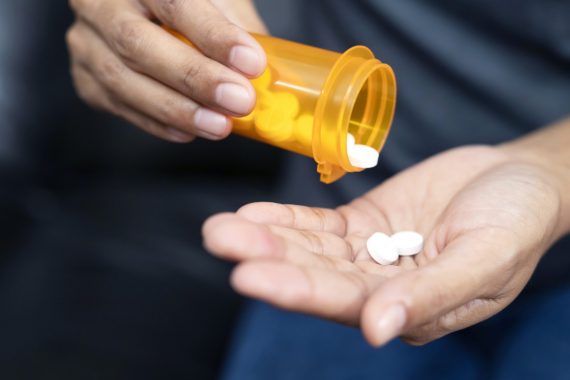There has been an ongoing fall in the use of opioids, benzodiazepines and Z-drugs in recent years, the NHS Business Services Authority said.
A million fewer patients are prescribed a potentially addictive medicine in primary care compared with seven years ago, new NHS figures show.
Figures from 2022/23 show 7.1 million patients prescribed a dependency forming medicine compared with 8.1 million in 2015/16 – a 12% drop.
The use of opioids – the most common addictive medicine prescribed in primary care – has dropped by 6% over the seven-year period and 1% since last year, the figures show.
Last year saw 39 million opioid items prescribed by GPs compared with 42 million items in 2015/16.
NHSBSA has been tracking the use of dependency-forming medicines in primary care since a review by Public Health England in 2019 found that one in four adults were prescribed potentially addictive medications.
Over the past seven years, prescriptions for benzodiazepines have fallen by 26% and Z-drugs by 17%, NHSBSA said.
But over the same time period, prescriptions for gabapentinoids have increased by 49%, the report noted. It did not include antidepressants.
The cost of the medicines to the NHS has also fallen dramatically with a 51% drop from 780 million to 380 million, a large part of which relates to pregabalin coming off patent in 2017 with cheaper generic options becoming available.
Women aged 55 to 59 were the most common group prescribed dependency forming medicines in 2022/23, the figures show.
And 56% more patients were prescribed the drugs in the most deprived areas of the country compared to the least deprived.
Earlier this year, NHS England said GPs should offer alternatives including psychotherapy, sleep clinics and social activities or clubs before prescribing addictive painkillers or antidepressants.
At the time figures showed GPs and pharmacists had already helped cut opioid prescriptions by 450,000 in under four years, saving lives and preventing 2,100 incidents of patient harm.
A GP-led trial in the North East and Midlands reported in June that a programme of dose tapering, group meetings and alternative therapies to help people manage their pain can help one in five people quit opioid prescriptions in a year.
NICE guidance on safe prescribing and withdrawal management for addictive drugs concluded that antidepressants were not ‘dependence-forming’ drugs, although they can cause withdrawal symptoms.
It also rubber-stamped recommendations that GPs should provide regular reviews for patients on antidepressants and drugs for chronic pain that may be addictive.


















READERS' COMMENTS [3]
Please note, only GPs are permitted to add comments to articles
At last, they have noticed – we have been doing this for ages; Now, time to move on the attention of HB /CCG Pharmacists to the secondary care doctors and noctors who are prescribing or recommending them.
I’ve even seen fewer ‘28 days zopiclone Gp to review’ TTOs from high intensity mental health teams!
Message seems to be getting through a little.
“NHS England said GPs should offer alternatives including psychotherapy, sleep clinics and social activities or clubs before prescribing addictive painkillers or antidepressants.” Sure. Try referring these and you get bounced and if we get a complaint I am sure NHSE will not back us up.